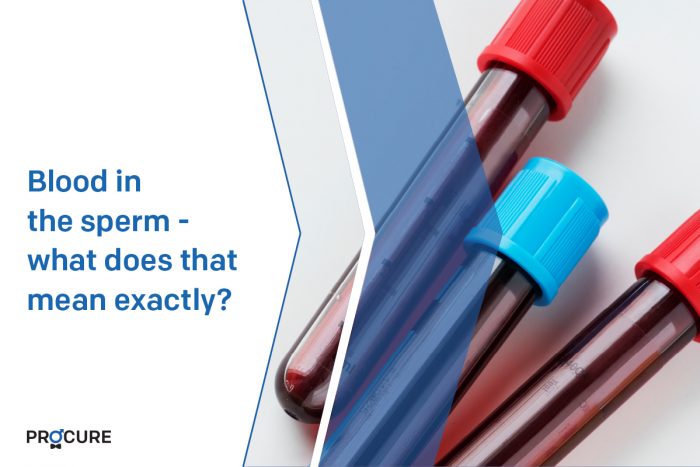Hemospermia is the clinical name given when there is blood in the sperm. Seeing blood in your sperm can be alarming. And while the presence of blood in your sperm may be cause for concern, it is generally not serious and does not require an immediate medical examination.
The presence of blood in the sperm is generally not a sign of prostate cancer and does not affect sexual function. Blood is most often noticed in semen right after ejaculation. The sperm may be pink or red, or even brownish if the bleeding is old.
The most and least frequent causes
Most cases of blood in semen are idiopathic, that is, they happen without warning, and doctors cannot determine the cause. These cases resolve spontaneously within a few days to a few months. This could be due to the minor rupture of small blood vessels in the seminal vesicles.
The most common cause is from a prostate biopsy. The bleeding may last a few weeks after this procedure. Bleeding can also occur after a vasectomy, where there is sometimes a small amount of blood in the semen during the first ejaculation(s).
Less common causes may include benign prostatic hyperplasia (BPH), a bacterial infection in the prostate or urethra, the presence of a sexually transmitted infection1 or, very rarely, the presence of cancer of the prostate.
When to consult
Before 40 years of age, the causes are essentially infectious and benign, not requiring a visit to a specialist in urology2. After this age, a more detailed examination is necessary for men who have symptoms lasting more than a month or who have abnormal results following examinations by the doctor.
For example, doctors examine the genitals for redness, lump, or tenderness. A digital rectal exam is done to detect an enlarged prostate, prostate tenderness, or the presence of a lump. A sperm analysis is rarely done.
Finally, the treatment targets the cause if it is known. Often no treatment is needed, and the blood spontaneously disappears.
Discover our new animated videos
Discover three new animated videos, each equally unique and original from one to the other. Be on the lookout!
Here is the first one – Symptoms, Risk and Screening
Take the time to visit each of our pages on this website, as well as our YouTube channel, in order to get familiar with the disease with our expert lectures, our section on available resources, the support that is offered to you.
Do you have any questions or concerns? Above all, do not hesitate. Contact us at 1 855 899-2873 to discuss with a nurse specializing in uro-oncology. It’s simple and free, like all our services.
Pages of our site that might interest you
Want to know more? Just click on one of the links below.
Recognize the signs and symptoms
Prostate related diseases
Can cancer be prevented?
New PROCURE news that may interest you
Each week, we publish a blog article. Here are a few for you.
Do you know your prostate?
I have a prostate pain. Is it cancer?
6 tips to keep your prostate healthy
Sources et references
1.Drake T, Hanna L, Davies M, Haematospermia[archive], BMJ, 2016;355:i5124
2.Ahmad I, Krishna NS, Hemospermia[archive], J Urol, 2007;177:1613-8
Written by PROCURE. © All rights reserved – 2020




